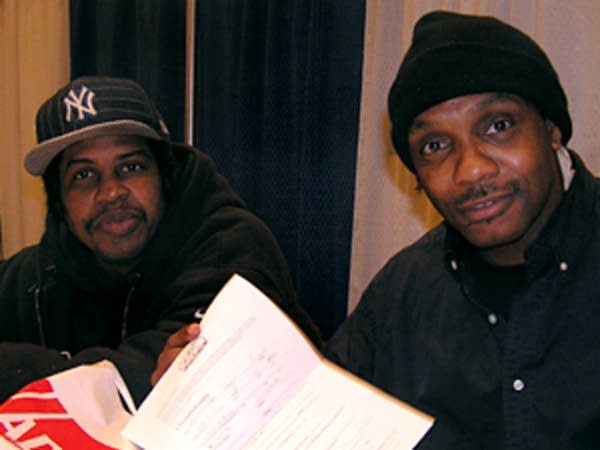MLK Day job fair draws thousands

The Minneapolis Convention Center was hopping Monday. The 7th Annual Martin Luther King Day Diversity Job Fair attracted some 40 employers and organizers said as many as 1,500 job seekers would be stopping by.
Emily Skinner used to work for Wells Fargo Home Mortgage. She says there is opportunity at the job fair for qualified applicants.
Nathan Hawkins is looking for something in retail sales or customer service. He says the country has made strides in equal opportunity since the civil rights movement of the 1960s, but there is still a way to go
Hawkins was laid off several months ago from a job in retail sales. He says he thinks opportunities for African-Americans have improved somewhat since Martin Luther King, Jr. made his "I Have a Dream" speech.
Create a More Connected Minnesota
MPR News is your trusted resource for the news you need. With your support, MPR News brings accessible, courageous journalism and authentic conversation to everyone - free of paywalls and barriers. Your gift makes a difference.
"We've made a few steps, I think. Could be better."
That view sums up the thinking of an expert on race and the economy. Algernon Austin studies employment trends and is Director of Policy on Race, Ethnicity and the Economy at the Economic Policy Institute.
He says today, 40 years after King shared his dream at the March on Washington for Jobs and Freedom, blacks are still twice as likely to face unemployment as whites.

"I mean, if you look at the unemployment rate that whites typically experience in a recession, those unemployment rates are still lower than the black unemployment rate in the best of times."
Austin says educational achievement is a factor, but research shows there is still significant discrimination in the workplace. Moreover, blacks have made some of their greatest strides in manufacturing, where jobs have been disappearing in recent years.
Minnesota has lost 62,000 manufacturing jobs since the industry's peak in 1998. The sector now employs fewer people in Minnesota than at any time in the last 16 years and employers are demanding better skills for the jobs that remain.
Austin says lower-income people of all races have lost ground as the gap widens between the wealthy and the poor.
On the other hand, he says when the economy is good, blacks tend to prosper along with other workers.
"When we do have economic growth, measured by job creation, we do see significant declines in black unemployment rates, and increases in wages, declines in poverty, and over the 1990s we saw all of those things occur."
Austin says the government should address the current economic downturn by investing in infrastructure to keep as much money as possible in the domestic economy.
In Washington D.C., there is general agreement on the need for an economic stimulus, but there is a partisan disagreement over what should be in the package.
The president wants to include incentives for businesses to invest. Democrats want to add spending for food stamps and unemployment benefits, as well as infrastructure projects.
